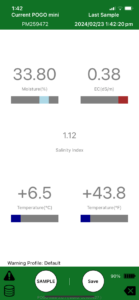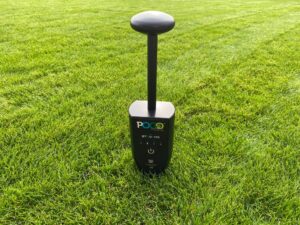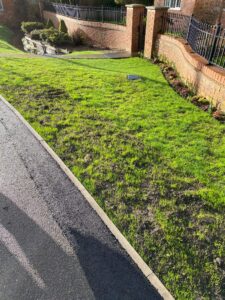We are now in late February, but is it too early to sow grass seed? The daffodils are out, the trees are beginning to show their buds and you are no doubt eager to get out into your garden and onto your lawn. There are several things that can affect lawn seed germination rate and different grass species are able to germinate at different times of the year. In this article we will dive a little bit deeper into seed germination and answer the question as to whether it is OK to sow grass seed in February.
Temperatures for grass seed germination
When it comes to grass seed germination different types of grass have different requirements. The key thing for successful germination is the soil temperature and not just the air temperature. In the spring the conditions can be quite deceiving because although the air temperature can start to rise it is often the case the nighttime temperatures are still very low. This will keep the soil temperature low and can slow down seed germination.
The weather conditions we tend to see now in the spring can pose a challenge if you are establishing a lawn from seed or repairing an existing lawn. Even by the time we reach mid – spring the weather conditions can still be warm in the day but cool at night. This is the reason why late autumn is a popular time to sow grass seed, as normally the soil temperatures are high.
Some grass seed species will germinate better at lower soil temperatures. The below information covers the three main types of lawn seed used in the UK;
- Perennial ryegrass: 7°C (with a germination period of 7-14 days)
- Red fescues: 11°C (with a germination period of 11-21 days)
- Bent: 15°C (with a germination period of 11-21 days)
Today ay Grass Seed Online HQ the sun is shining but what are the soil temperature? Lets have a look!

Soil temperature reading taken with a Pogo soil probe.

POGO Soil Moisture and Temperature Probe
Three different readings with a Pogo moisture probe give an average soil temperature reading of 6.9 degrees Celcius. So this is fractionally below the required germination temperature for Perennial Ryegrass. These readings were taken at 1pm, so they will drop into the evening and through to the morning. At these levels Perennial Ryegrass will certainly germinate, but it just might take a little bit longer than usual. The photo below shows an area that was sown with grass seed following some road works in the third week of January, it has germinated fine but it has taken 5 weeks to get this far.

Grass seed germinating in February
Other grass seed types will happily sit in the soil until the conditions are right for them to germinate. Grass seed germination is simply a result of a biological chemical reaction within the seed. Temperature serves as a catalyst in this reaction, increasing the speed of the reaction. If the temperature drops, so does the speed af the reactions and in turn the seed germination.
Do soil types affect grass seed germination?
Soil types certainly do have a big impact on grass seed germination. More specifically it is the amount of moisture held by different a soil type that effects the germination rate.
Soil is basically made up of organic material, mineral material, water and air. As water heats up slower than air, it means that soils that retain more moisture will in turn be slower to warm up. This means that a heavy clay soil will stay colder for longer in the spring. At the other end of the spectrum, a light sandy soil with plenty of soil pores that are full of air will warm up quicker. So in the spring a sandy soil will generally give better grass seed establishment. But be careful, because a sandy soil will be the first to suffer if conditions turn dry!
It is worth mentioning that compact soil can also effect on lawn seed germination. If a soil is too compacted it will hold more moisture, be colder and therefore provide less favourable conditions.
Moisture levels for grass seed germination
If the soil temperature is good the next element to provide the perfect conditions is soil moisture. To get grass seed to germinate it is crucial to keep the soil moist. Grass seed does not need loads of water, but just enough to prevent it drying out and stopping the germination process.
The best way to ensure constant moisture around the seed is to ensure that the seed is incorporated as well as possible into the top 10-15mm of the soil surface. Grass seed that is left on the surface is prone to drying out. With the seed nicely covered by soil all that is required is a light watering to keep up moisture levels.
In the early spring be cautious of applying too much water with a hosepipe. Tap water is always much colder than natural rainfall and can therefore lower the surface temperature, slowing down the seed germination.
Best grass seed for germination
For reliable and quick germination always choose a mixture that contains Perennial Ryegrass, such as our Hardwearing Grass Seed, Multi Purpose Grass Seed or Lawn Repair & Renovation Grass Seed. Ryegrass will make a fantastic lawn whether you are establishing a lawn from scratch or renvoting a lawn as part of a lawn care plan. With required soil temperature of 7 degrees Celcius it means that it is possible to achieve germination from February through to November.
Conclusion
When it comes to sowing grass seed, it does not matter what month is it. What really matters is that the soil temperature is high enough and there is adequate moisture. It can be hard to judge due to our increasingly unpredictable climate in the UK where adverse weather conditions never seem to be far away. If you want to sow grass seed now (end of February), you should be OK but do remember that it will likely take a bit longer than you might usually expect.